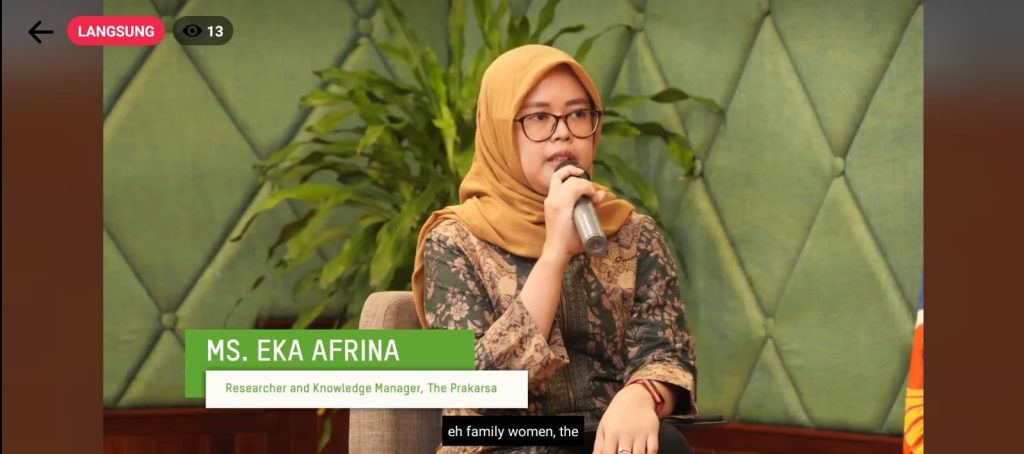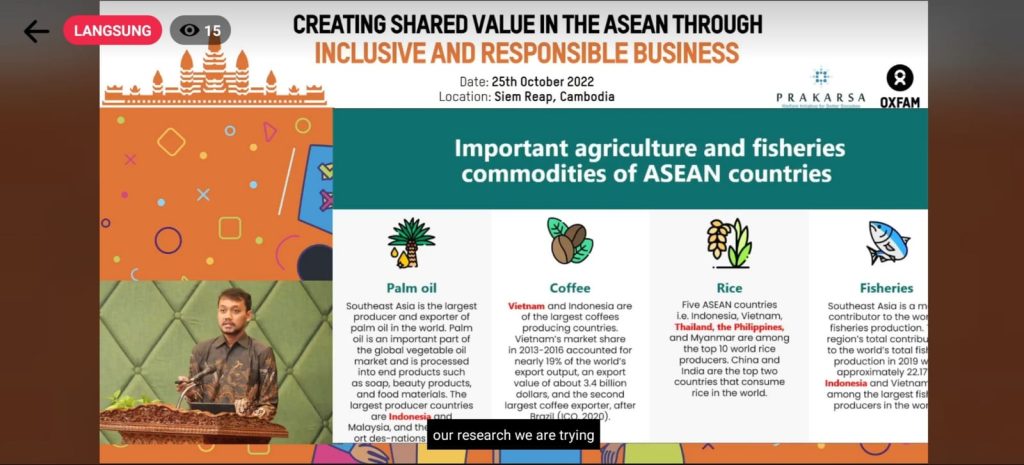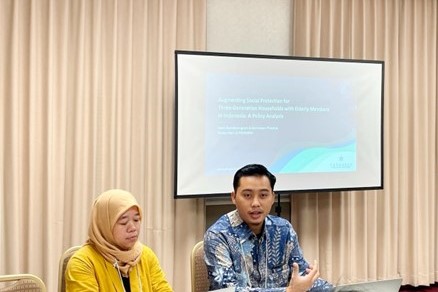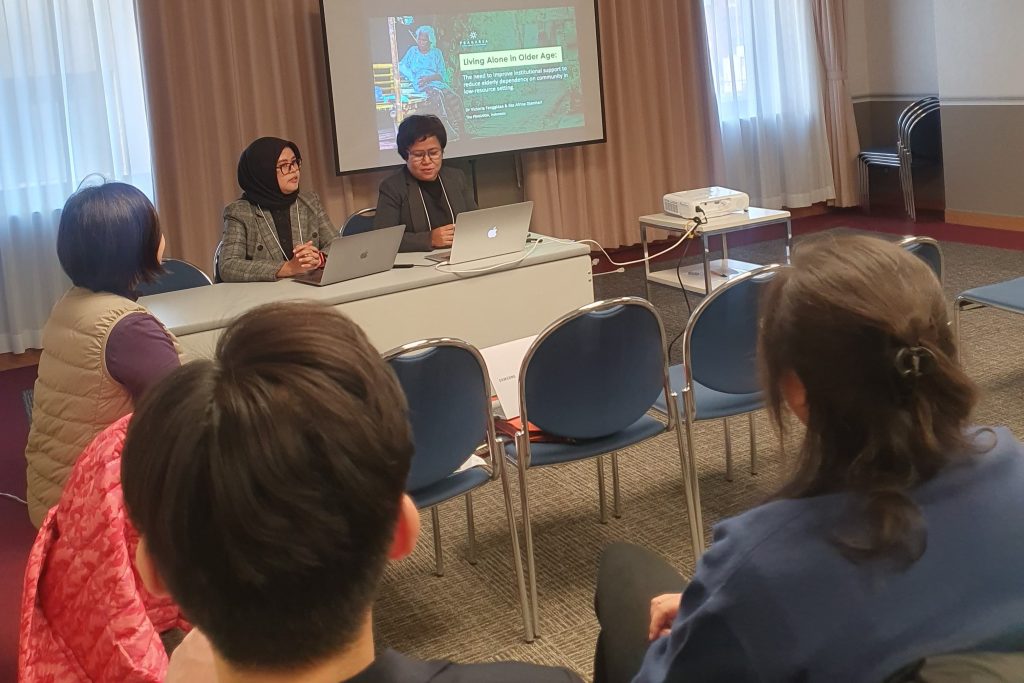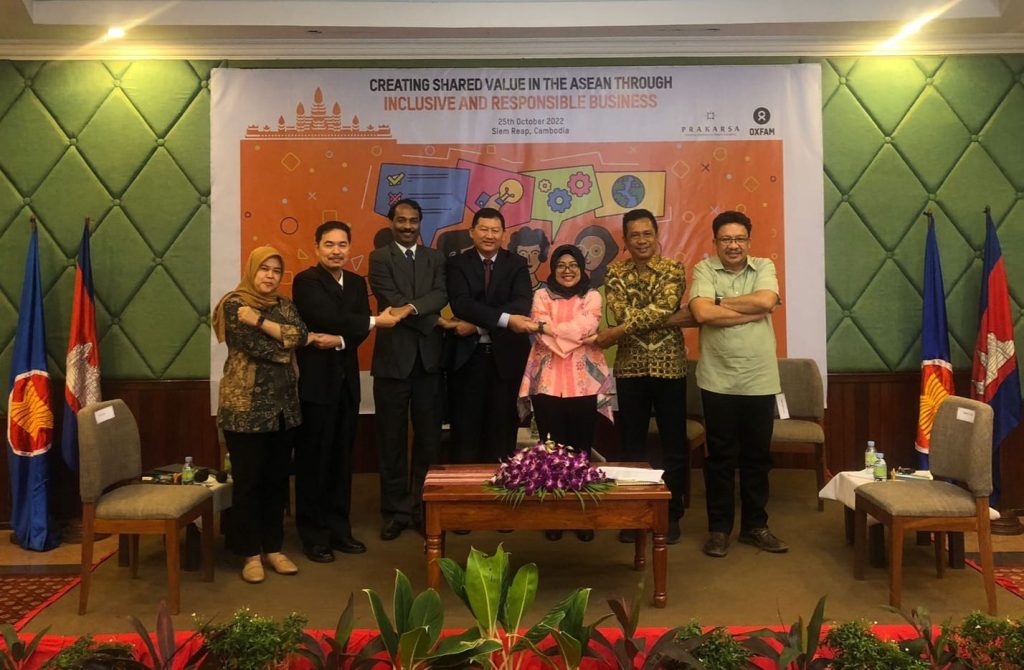
The PRAKARSA with Oxfam in Asia held side event in the form of discussions at the 2022 Fifth ASEAN Inclusive Business Summit in Cambodia. This activity has the theme 'Creating Shared Value in The ASEAN Through Inclusive and Responsible Business', on Tuesday (25/10/2022).
Apart from The PRAKARSA and Oxfam in Asia, this activity was also attended by Under Secretary of State and Spokesman Ministry of Commerce of Cambodia HE Penn Sovicheat, Director of ASEAN Trade Negotiations at the Indonesian Ministry of Trade Dina Kurniasari, and Rice Program Manager Rikolto Indonesia Nana Suhartana.
On this occasion, Research and Knowledge Manager The PRAKARSA Eka Afrina started the discussion by explaining the results of the research PRAKARSA related to Global Value Chains (GVC) entitled 'Tracking Global Value Chains (GVCs) on Palm Oil, Fisheries, Rice and Coffee Commodities in Indonesia, Thailand, The Philippines, and Vietnam'. This study aims to identify patterns and patterns of shifting GVC for oil palm, fisheries, rice and coffee in Indonesia, Thailand, Vietnam and the Philippines and to find out whether the supply chain system for the four commodities in the four countries is inclusive and beneficial for marginal actors such as farmers and farmers. small fishermen, and women workers.
The inclusive business guidelines are guidelines that have been endorsed by the ASEAN Economic Ministers in 2020. The guidelines outline how inclusive business can be supported at the national level, and what institutional arrangements are needed to implement them.
The Guidelines also provide recommendations on how ASEAN policymakers can collectively promote inclusive business at the regional level. In addition, the adoption of inclusive business principles is also believed to support sustainable livelihoods. The Asian Venture Philanthropy Network (AVPN) in 2019 estimated that inclusive businesses in ASEAN could potentially create 1,8 million jobs.
However, according to Eka, implementing inclusive business guidelines encounters various challenges. Based on research PRAKARSAIn general, fishermen and small farmers in ASEAN are actors who receive the least value from the existing value chain, so they still have to deal with problems in the form of multidimensional poverty risks.
“Traditional fishermen generally live in poor housing conditions, dense settlements, lack of access to clean water, poor sanitation conditions and inadequate working conditions. Meanwhile, small farmers face problems in the form of agricultural insurance and climate change problems,” explained Eka.
The problem of climate change they face increases losses and damages, so that farmers do not benefit and cannot save because of high production costs. In addition, rising temperatures, droughts and floods have affected the volume and quality of crop yields. “Even rice farmers in Thailand and the Philippines have had difficulty predicting the start of the growing season and have faced crop failures due to climate change over the last few decades and fishermen in Indonesia have difficulty determining fishing seasons and determining fishing distances due to changes in weather and climate.” said Eka.
Eka added, in addition to these problems, small farmers and fishermen also face problems in the form of gender discrimination as experienced by female oil palm workers, lack of increased competitiveness for marginal actors such as lack of technology improvement for small farmers and traditional fishermen.
"And problems in the form of lack of access to capital due to lack of financial literacy and banking players are generally reluctant to extend credit to small farmers because of the high level of bad loans," said Eka.
For this reason, according to Eka, the government must increase access for marginal actors to participate substantially in GVC. In addition, the business community must also comply with policies and regulations related to workers' rights and living standards.
"As well as civil society organizations (CSOs) must also work together to monitor the implementation of the ASEAN inclusive business framework in the global value chain and ASEAN inclusive business guidelines must take into account gender sensitive policies and social protection," said Eka.
In line with this, Oxfam in Asia's Lead Private Sector Engagement Team, Jacques Chai Chomthongdi said, "The ASEAN Inclusive Business Guidelines must be able to contribute to addressing social impacts, issues relevant to women, economic empowerment and social protection, and climate resilience.
“MSMEs should be at the core of promoting inclusive business, in partnership with MSMEs and business development bodies of ASEAN member countries which are in the best position to promote and support inclusive business in their respective jurisdictions,” Jacques said.
Jacques also said that ASEAN should consider a more inclusive accreditation mechanism that ideally is led by the private sector through a consortium or multi-stakeholder, with the main consideration being affordability and accessibility, especially for MSMEs.
"ASEAN must also encourage its member countries to coordinate and develop ASEAN inclusive business guidelines through policy dialogue, and in establishing partnerships with relevant government agencies and accelerating the implementation of guidelines through relevant ministries that focus on dealing with inclusive business," concluded Jacques.
